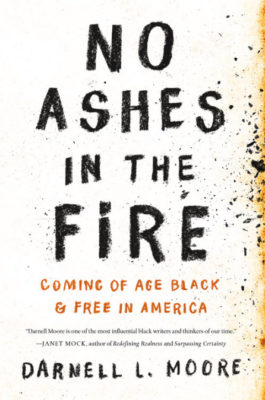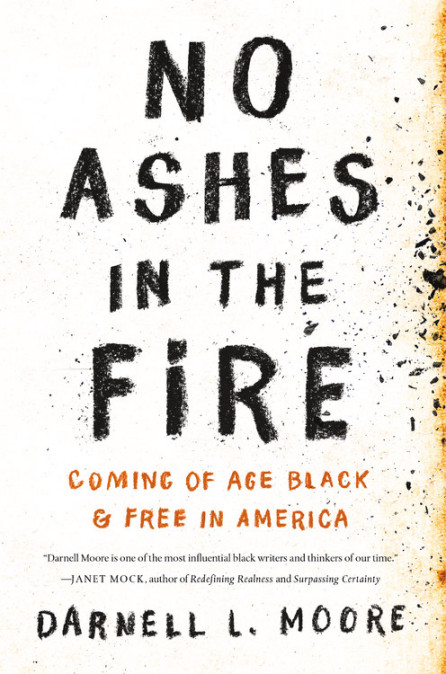It’s a rare thing for a book to conclude and the reader’s biggest complaint be that there quite wasn’t enough of it. Yet, that’s what Darnell L. Moore accomplished with his memoir No Ashes in the Fire. It’s an impressive work of introspection, family heritage, and the intersectionality of race, sexuality, gender, and even faith, all the more so because it’s done in beautiful prose.
Many people come to understand that they resemble their parents despite their intentions. This is how Moore describes growing into an adult who considered his abusive father as normal.
I hadn’t yet realized I was his son, his likeness, an ellipsis extending his presence in the world.
Moore grew up in Camden, New Jersey, a city that became largely black and Latino then had its minority neighborhoods punished for that fact with the area’s trash incinerator and city’s waste management facilities, along with the accompanying smell.

They were punished with redlined homes priced at a premium for new black and brown residents moving in then devalued to steal wealth from their descendants, both in terms of their inheritance losing value and in school-funding based on property values.
They were punished with law enforcement more interested in maintaining an unequal social order than keeping any peace.
The author traces the effect of these sorts of things on his family history and own life, first researching how his ancestors moved from Virginia to settle in New Jersey and how their lives shaped his own.
This would have been a worthwhile complete story in itself.
For most people, their great-grandfather dying in 1917 with pneumonia and influenza on the death certificate would be pretty straightforward, part of the global pandemic that killed millions of other adults the same way.
But stories passed down in Moore’s family involve the justified paranoia that he was killed at work in a mining accident, something covered up with a convenient excuse— because who would care how a black man died except his family?
Who would listen to them if they did?
Moore also speaks lucidly about his sexuality, and the main thread of the memoir is how his love for other boys led to the sort of discrimination and abuse that is not intergenerational but applied fresh to each person, but how this interacts with systems of oppression like racism and misogyny.
For example, despite his own intellect, Moore’s initial poor education in public school resulted from the racial discrimination passed through generations; so was his family’s difficulties affording a better private school.
But being doused in gasoline — a still-breeze from immolation via lit match—that was the cruelty of one group of neighborhood boys, only.
“Intersectionality” is a term people on the left, at least, have come to better understand and apply critically in recent years, no longer restricted feminism and race but more generally. Moore’s memoir is keenly influenced by this, as well, and he demonstrates it throughout his recollections of his life.
One thing a successful memoir must have, and so many lack completely, is self-awareness. Moore keeps in the forefront not just those aspects of his identity and situations that have made his life harder but easier as well. He’s aware of the added layers of discrimination women of color, especially trans women, face that is still prevalent within communities, black, religious, and so on. And he’s skilled enough to make these points organically more often than didactically.
The biggest issue is that the book concludes effectively demonstrating how Moore was shaped to be the person that he is but without a great idea of why that was important or the ways he’d taken those lessons into the world around him.
Everything seems to build toward Moore coming out to his mother, her already knowing he loved other men but waiting for him to tell her so, then the relief that being his complete self around everyone in his life brought to him.
This must be a misinterpretation on my part because there’s fewer than twenty-five pages that follow Moore doing this, and he sketches out very little of what it meant to reconcile his own identity, queer, black, and Christian.
He mentions organizing a freedom ride to Ferguson, Mo., after the extrajudicial execution of Mike Brown by officer Darren Wilson in 2014. He mentions his work in 2010 police killing of DeFarra Gaymon. Functionally, the book ends up stopping with Moore’s life at his coming out in 2004 at age twenty-eight.
It’s possible Moore assumes readers to already be familiar enough with his life to fill that in for themselves, but it is not actually demonstrated in the book. It certainly would not have been burdensome to have another fifty or even a hundred pages functioning essentially as payoff for what came before.
The subtitle is “Coming of Age Black and Free in America”, and if this one falls short, it’s in how it fails to complete the coming-of-age story showing sufficient contrast to what came before the journey’s end.
Memoirs are not biographies, but many a biography will telescope the first decades of a person’s life down to a few dozen pages before following in more detail once they get out into the world and start doing the work of their life.
This, unfortunately, is just the opposite.
The other noticeable issue is where faith factors in to Moore’s life.
This, again, may be a fault of my expectations.
Moore describes a near-death experience in college due to a congenital heart problem exacerbated by drug use that led to him going back to church and devoting himself to his Christian faith, even while continuing to have relationships with men in secret and to feel guilty about it.
Eventually, he realizes he doesn’t need to live in secret or hide who he loves.
But the entire time he’s describing his faith, Moore doesn’t really seem to talk much about God or Jesus or have a worldview of a literal supernatural deity that acts upon the world, even of an afterlife.
That’s not to assume that everyone’s understanding of religion is the same, but I kept expecting an outright rejection or redefinition of his beliefs that never came. Ultimately, considering he earned a Masters in Theological Studies from Princeton, Moore comes across as religious, but not spiritual.
No Ashes in the Fire has the sort of voice that we need more of, and we need to do a better job amplifying them when they do appear. On top of that, it’s consistently beautifully written. Definitely add it to your reading list.

